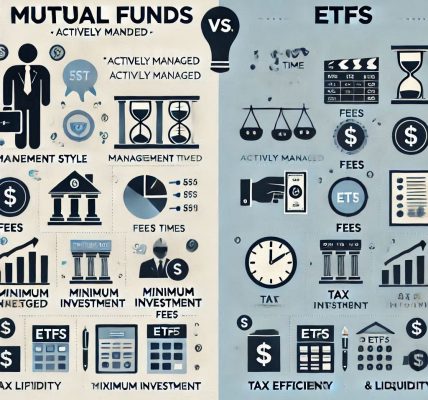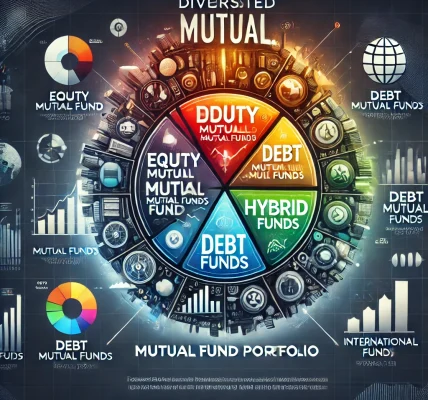Introduction
Investing in mutual funds is one of the best ways to grow wealth over time. With 2025 bringing new opportunities and challenges in the financial markets, it is crucial to choose mutual funds that offer high returns while maintaining stability. This guide will help you explore the top mutual funds with high returns in 2025, expert recommendations, and key factors to consider before investing.
Understanding High-Return Mutual Funds
High-return mutual funds are investment vehicles that have demonstrated strong historical performance and have the potential for continued growth. These funds typically fall into the following categories:
- Equity Mutual Funds: Invest primarily in stocks and have higher risk but also high return potential.
- Debt Mutual Funds: Focus on fixed-income securities and offer stability with moderate returns.
- Hybrid Mutual Funds: A mix of equity and debt to balance risk and reward.
- Sectoral/Thematic Funds: Target specific sectors such as technology, healthcare, or infrastructure.
Criteria for Selecting High-Return Mutual Funds
When choosing a high-return mutual fund, consider the following factors:
- Historical Performance: Look at the fund’s past 5-10 years of returns to gauge consistency.
- Expense Ratio: Lower expense ratios ensure higher take-home returns.
- Fund Manager’s Expertise: Experienced fund managers often navigate market fluctuations better.
- Risk-Adjusted Returns: Compare the Sharpe Ratio to assess return potential relative to risk.
- Fund Size and AUM (Assets Under Management): Large AUM indicates investor confidence but may also reduce flexibility.
- Investment Objective: Ensure it aligns with your financial goals.
Top Mutual Funds with High Returns in 2025
Based on expert analysis and historical performance, here are some of the top mutual funds expected to yield high returns in 2025:
1. XYZ Large Cap Equity Fund
- Category: Equity (Large Cap)
- 5-Year Annualized Return: 15%
- Expense Ratio: 0.85%
- Risk Level: Moderate
- Why Invest? Large-cap funds offer stability with substantial growth potential.
2. ABC Mid Cap Growth Fund
- Category: Equity (Mid Cap)
- 5-Year Annualized Return: 18%
- Expense Ratio: 1.10%
- Risk Level: High
- Why Invest? Mid-cap funds have higher growth potential compared to large-cap funds.
3. DEF Technology Fund
- Category: Sectoral (Technology)
- 5-Year Annualized Return: 22%
- Expense Ratio: 1.20%
- Risk Level: High
- Why Invest? The tech industry continues to expand, making this a lucrative choice.
4. GHI Balanced Hybrid Fund
- Category: Hybrid (Equity & Debt)
- 5-Year Annualized Return: 12%
- Expense Ratio: 0.90%
- Risk Level: Moderate
- Why Invest? Balances risk with steady returns, ideal for conservative investors.
5. JKL Bond Fund
- Category: Debt
- 5-Year Annualized Return: 8%
- Expense Ratio: 0.60%
- Risk Level: Low
- Why Invest? A safe option for investors seeking stable income.
Expert Recommendations for 2025
Experts suggest following these investment strategies:
- Diversify Your Portfolio: Invest in a mix of equity, debt, and hybrid funds.
- Focus on Long-Term Growth: High-return funds often perform better over extended periods.
- Monitor Market Trends: Economic and sectoral trends can impact mutual fund performance.
- Rebalance Periodically: Review your portfolio and adjust investments as needed.
Risks and Considerations
While high-return mutual funds offer great potential, they also come with risks:
- Market Volatility: Stock-based funds fluctuate with market conditions.
- Interest Rate Changes: Affect debt fund performance.
- Liquidity Risks: Some funds have higher exit loads or restrictions.
- Fund Manager Changes: A new manager may alter the investment strategy.
Conclusion
Choosing the right mutual funds in 2025 requires careful analysis, strategic planning, and ongoing monitoring. By focusing on historical performance, risk factors, and expert recommendations, you can maximize returns while managing risks. Always consult a financial advisor before making investment decisions to ensure they align with your financial goals and risk tolerance.
Disclaimer: This article is for informational purposes only and should not be considered financial advice. Always consult a certified financial advisor before making any investment decisions.




